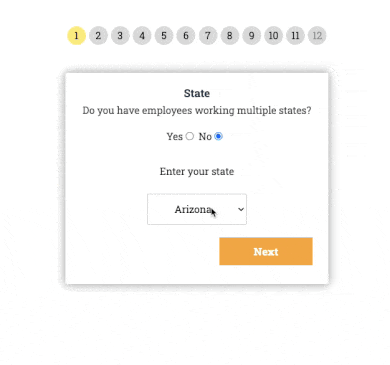

Indiana employee handbook overview
When developing an Indiana employee handbook, it is necessary to include both state-specific and federal policies. Regardless of whether all of your employees are in Indiana or just a few, you will require an Indiana-specific handbook to guarantee that your workers understand the policies and entitlements granted to them by their state.
You can discover the compulsory state policies for Indiana, federally mandated policies, and other optional policies below.
What should be included in a Indiana employee handbook?
Every handbook should include Federal, State, and (if applicable) City-specific policies. Below are Indiana-specific policies that should be included in your handbook.
- Indiana Civil Air Patrol Leave Policy: Employers are required to include a policy that provides protections for employees who need to leave for Civil Air Patrol duties.
- Indiana Lactation Accommodations Policy: Employers are required to provide time and a private space for nursing mothers to express breast milk.
- Indiana Volunteer Firefighter and Emergency Medical Services Leave:Employers are required to provide leave for employees serving as volunteer firefighters or members of a volunteer emergency medical services team to respond to an emergency or care for an injury that occurred while responding to an emergency.
- Indiana Jury Duty Policy: Employers are prohibited from retaliating against employees for responding to a jury duty summons and may not force them to use accrued leave.
- Indiana Meal Breaks for Young Workers Policy: Employees under the age of 18 are allowed one or two meal breaks totaling 30 minutes when working for 6 consecutive hours.
- Indiana Military Leave Policy: Employees who are members of the Indiana National Guard are provided up to 15 days of leave for training. The employee’s accrued vacation, sick, or other leave is not affected by the use of this leave.
- Indiana Military Family Leave: Certain family members of a person who is called to active duty may request leave for up to 10 days of unpaid leave. This leave may be taken 30 days before orders take effect, during active duty, or 30 days after active duty orders are terminated. This leave applies to employers with 50 or more employees.
Create your Indiana employee handbook now
Federal Policies
Don’t forget about federal policies
There are policies that should be included in every handbook to comply with US labor and employment law. Many states require additional provisions. However, this list includes core federal requirements and best practices applicable to most businesses.

Core federal policies
- Equal Employment Opportunity and Anti-Discrimination Policy Show me!
- Anti-Harassment and Complaint Procedure Show me!
- Family Medical Leave Act (FMLA) Policy Show me!
- Americans with Disabilities Act (ADA) & Reasonable Accommodation Policy
- Military Service Leave (USERRA)
- Wage and Hour Compliance Policy (FSLA)
- At-Will Employment Notice Show me!
- Polices if you employ federal contractors (Pay Transparency Policy, Whistleblower Protection, Drug-free Workplace Policy)
Highly recommended policies
- Workplace Violence Prevention Policy
- Code of Conduct Policy
- Nursing Parents Policy
- Conflict of Interest and Business Ethics
- Disciplinary Procedures
- Use of Company Property
- Employee Classification and Pay Practices
- Health and Safety Policy
- Confidential Company Information
- Open Door Policy
- Receipt of Non-Harassment Policy
- Use of Communication and Computer Systems
- Workplace Searches and Inspections
Additional policies to include
- Industry-specific policies
- Sick Leave, Vacation Leave, PTO policy
- Company Vehicles Policy
- Punctuality and Attendance
- Benefits
- Working Schedule
- Employment Records
- Smoking
- Overtime
- Performance Reviews
- Social Media Policy
- Remote Work Policy
- Introductory Period Policy
- References
- Hiring Relatives and Significant Others
- Business Expense Reimbursement
Get all recommended policies from the free handbook builder.
Indiana labor law posters
Understanding labor law poster requirements can be a bit like trying to decode a complex puzzle. You need to comply with both state and federal requirements.
Why Should I Care About Displaying Posters?
You might be wondering why it's so important to display these posters in the first place. State and Federal laws mandate that employers must have up-to-date labor law posters conspicuously displayed for their employees. Failing to do so not only results in steep fines (up to $35,000 in federal fines and additional state fines) but also exposes you to real liability.
Consider this scenario: if an employee decides to bring a lawsuit against your company, and you don't have the required posters or they are outdated, you could face even more significant problems:
- Statute of Limitations: Normally, there's a limited window within which an employee can file a lawsuit against you. However, if you didn't inform your employees of their rights through proper poster display, a court might decide that the statute of limitations doesn't apply.
- Operating in Bad Faith: Courts may determine that you were intentionally withholding information from your employees, which could lead to a finding that you were operating in bad faith. This can substantially increase your liability.
What Are the Requirements for Displaying Labor Law Posters?
Labor law posters must be displayed at every physical location where you have employees, and they need to be conspicuously displayed for all to see.
- If you have a hybrid workplace with both in-person and remote employees, you'll need physical posters at your facilities and electronic distribution to your off-site workers.
- For fully remote companies, you can distribute posters electronically by sharing a permanent link to the appropriate posters.
- Some posters also need to be visible to job applicants, such as FMLA, Equal Employment Opportunity, and Employee Polygraph Protection posters, as per the guidance provided by the Department of Labor.
What Labor Law Posters Do I Need to Display?
You'll need both Federal and State labor law posters for each state where you have employees. The good news is that all the posters you need are provided for free by the federal government and state departments of labor. You've probably seen those convenient "all-in-one" laminated posters, but if you prefer, everything you need is also available as a free, printable document from the Indiana Department of Labor.
Federal Poster Requirements
Determining which federal posters you're required to display can be influenced by various factors, including your industry, the size of your company, benefits you provide and union affiliation.
The good news is that there's a handy tool to help you understand precisely which federal posters your company needs. You can use the Federal Poster Advisor tool to determine your specific federal poster requirements.
Indiana Labor Law Poster Requirements
You can refer to the Indiana Department of Labor for free, printable posters.
Download Indiana labor law posters hereWhat’s included with the handbook builder
Creating a new handbook only takes a few minutes. And it’s easy. You can get started by answering a few interactive questions about your company. A few examples:
- How many employees do you have?
- Do you have employees in multiple states?
- Do you have an introductory period for new employees?
- Do you offer paid holidays?
- What is your payroll schedule?

Communicating your company culture
In all businesses, building a strong company culture can be essential to boosting morale and aligning employees. Arguably, it is even more key for small businesses. With a small team, the impact of a strong culture is made more apparent. Here are some important things to remember when building a strong company culture.
Evaluate Your Current Culture
Since company culture is primarily determined at the top, here are some key questions to ask your leadership team to evaluate where your culture currently stands:
- Are we open about how things work at our company?
- Do our employees know what is expected of them?
- Do we value our employee’s feedback?
- How do we demonstrate that our employees are valued?
- What are our company values?
- Do we clearly express these values?
Set Your Goals
From your answers to the previous questions, pinpoint what is lacking and make goals to improve on those areas. This could mean having clearer communication for employee expectations, defining company values, or creating monthly team-building activities to build morale.
Respecting Employee’s Work-Life Balance
A large part of communicating that your company values its employees is demonstrating respect for their lives outside of work. A strong employee handbook can allow this to be done in a clear, effective way. Company leaders should detail expectations, but also be open about their own work-life balance to build transparency. Trust is key in a great company, and when leaders show genuine empathy for employee responsibilities at home, a foundation for transparency and cooperation is built.
The Link Between Culture and Happiness
Many surveys and analyses of employee feedback indicate that the majority of employees care as much about the culture of the company they work for as their salary. In small companies, culture is frequently undervalued. In order to reduce turnovers and increase recruitment, companies need to understand that there is a link between strong culture and the one important question employees think about regularly: “Am I happy working here?”.
Understanding and Communicating Your Company’s Culture
In order to effectively communicate your company’s culture, you need to understand it. By asking your team the right questions, setting goals, and valuing employees, you can be sure to be on the right track.
Communicating this culture is an essential next step toward aligning with your employees. Not every culture is a good fit for every employee, and being honest upfront is important for making sure you are hiring employees best aligned not only with the skills a company requires, but the culture of the workplace. Research shows that when looking for a job, 77% of people polled would consider a company’s culture and work atmosphere before applying. By clearly communicating your company culture up front, you can ensure that more candidates who align with your team values will apply for a position.

Still have questions?
Can’t find the answer you’re looking for? Please chat with our friendly team.
Contact UsEmployee Handbook Resources
Best practices, guidance and information for companies





